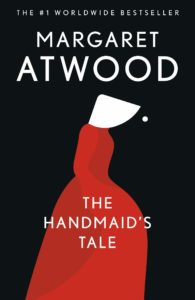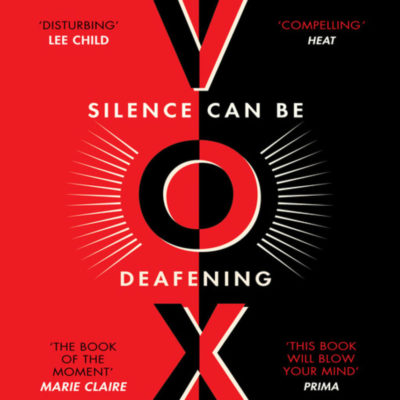Can you imagine a world where you are only allowed to speak a certain amount of words per day? Imagine if the amount was 100 words. It does not take a conversation analyst to argue or explain that this number is incredibly low, just try counting the number of words you have used in your last conversation today, and you will see how the numbers add up pretty quickly. Imagine if a metal bracelet around your wrist keeps track of your verbal behavior. Then imagine that, if you exceed this number, the bracelet will give you an electric shock. Finally, imagine if this only applies to women.
This is the world that the author Christina Dalcher invites us in to in her novel Vox. We are following the character Dr. Jean McClellan, a middle-aged neuro-linguist specialised in aphasia, in a world, where women are being domesticated and downgraded to powerless mutes. The government is lead by a reverend, and old Christian traditions are now the law, which means that sex before marriage, adultery and homosexuality are illegal.

Women are not allowed to work outside the house because now, keeping a house, being a wife and motherhood are the finest (and only) jobs for women. This means that women are no longer working, and our main character Jean stops working on a project to develop a serum to cure aphasia to become a simple silent housewive. Besides her unemployment, other laws are preventing her to continue her work; women are not allowed to write or read. Men, on the other hand, are allowed to work and to speak, read and write all the words they like. But when the president’s brother gets in an accident, they ask for Jean’s expertise. We follow her battle with the system, her fight for women’s rights and her inner battles with family life and guilt.

The novel is quickly read, and the short length of the chapters makes it particularly easy to read – especially, when being on the run and commuting a lot. Sadly, this female-suppressed dystopian world is not a brand new idea, so if the paragraph above sounds pretty well-known to you, you might be familiar with the books and the popular TV-show The Handmaid’s Tale. If not, be prepared to be shocked and terrified by the dreadful episodes in the book! If you already liked the The Handmaid’s Tale universe, you might like Dalcher’s (quite similar!) universe as well. I am a Handmaid’s Tale fan myself, and I did enjoy reading the book but I really missed the thrill of hearing about such an absurd world with these horribles events for the first time. At times, I thought I had lost my sense of humanity because I did not get so surprised when reading the book.

Jean is a neuro-linguist, and this review is for Lingoblog, so it is inevitable to deal with the book from a linguist’s point of view. Particularly as a linguist, you might have several questions regarding an anti-aphasia cure and how Dalcher manages to deal with this in the book. But with Dalcher’s own background within theoretical linguistics, she actually gets the job done better than I had expected. You might also end up asking how the word counting bracelet can detect all spoken words, when even Siri or Google are struggling to detect words when people are whispering or when there is “too much distance” between the voice and the microphone. There are definitely some “linguistic black holes” throughout the book, but you get so drawn into the universe and the story that you forget about them (for a while).
Last but not least, Dalcher wants us to wake up, take a look at our society, and do something about it before it is too late. She wants us to be aware of the signs and most importantly: react. This is a really inspiring point with a really frightening message as well; you never know if you all of a sudden become a mute with figures on a word counting bracelet.
Christina Dalcher‘s dystopian novel Vox has been translated into dozens of languages, but not yet into Danish.
Andrea Bruun finished her Master’s degree in Linguistics in June 2019 at Aarhus University. She is now doing a PhD on prognostic decision-making at the Marie Curie Palliative Care Research Department at UCL (University College London).





